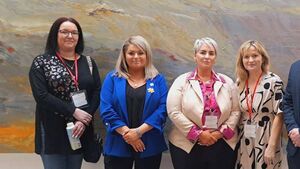Portlaoise woman gets SF support for sex offender reforms

Portlaoise woman Sonya Stokes (middle) with Laois Senator Maria McCormack (second from left), Leona O'Callaghan, Sheneda Daly and justice spokesperson Matt Carthy at the Sinn Féin meeting in Leinster House
A PORTLAOISE woman who was brutally raped by her uncle as a child has secured strong backing from Sinn Féin, as she campaigns for stricter conditions for sex offenders on their release from prison.
Laois Senator Maria McCormack and justice spokesperson Matt Carthy TD were among the party representatives who met with Sonya Stokes at Leinster House on 3 April, together with Sonya’s friends and fellow child abuse survivors Leona O’Callaghan and Sheneda Daly.
Now a mother-of-five whose youngest child is eight, Sonya was repeatedly raped from the age of seven by her uncle Joseph Hogan, who was released from the Midlands Prison in Portlaoise last month after serving ten years of a 15-year jail sentence. He returned to his native Limerick city that day.
Originally from Limerick but living in Portlaoise for many years, Sonya (47) has been campaigning since Hogan’s release for stringent conditions regarding high-risk convicted sex offenders, including electronic tagging.
Following the meeting in Leinster House, a party spokesperson said: ‘Sinn Féin had a very constructive meeting with survivors of childhood sexual abuse today. We listened to harrowing stories from the women and Sinn Féin spokesperson on justice, Matt Carthy, has committed to work on the issues which they raised.
‘In particular, Sinn Féin will work to bring forward proposals to better support victims, as they seek justice through the judicial process, and for a more robust and victim-centred approach to the release and monitoring of sexual offenders.’
Sonya waived her anonymity in 2015 when her uncle was jailed for repeatedly raping and sexually assaulting her at his Limerick city home between 1984 and 1988, when she was aged from seven to 11.
Together with Leona and Sheneda, she is urgently seeking stricter release conditions for child sex offenders, particularly in relation to their accommodation to ensure that they have no access to children. The conditions would include mandatory electronic tagging following their release, so that their whereabouts is known at all times.
The survivors also believe it should be a criminal offence for convicted child rapists to live or work in the same city, town, village or area as their victims, following release from prison.
In a statement following their meeting with Sinn Féin, Sonya said: ‘We stand together to fight for better treatment of survivors and real changes in the system, not just for ourselves but for countless others who have suffered and continue to fight for justice.
‘Victims Voices, the support group I started, is leading the fight for these reforms. Along with the trauma support led by Leona and the Survivors Side by Side page started by Sheneda, we have built a strong community. We stand together as survivors and fighters, determined to make a difference.’
Sonya said that, in the meeting with Sinn Féin representatives, the trio spoke on behalf of countless victims and survivors, asking for ‘real action, not just promises’.
She said: ‘We were glad to see Sinn Féin take a serious and supportive approach and, for the first time, we felt truly heard. As I told the representatives, actions speak louder than words. Survivors need real changes, not empty promises. Matt Carthy agreed, saying he can’t make guarantees but will do everything in his power to push for reforms. Sinn Féin plans to look at how other European countries handle these issues, to see what can be applied in Ireland.’
One of the main issues discussed at the meeting was electronic tagging for offenders out on bail. While there are concerns about human rights laws, Sinn Féin is looking at possible ways to put stricter limits on alleged sex offenders awaiting trial. Other ideas include automatic protection orders and barring orders to keep offenders away from victims’ homes and workplaces. Victims could also be provided with written guides, to help them understand the legal process and the support available for their mental health.
Sonya observed: ‘The system is badly broken. One of the biggest problems is that police and agencies don’t communicate across borders. My abuser, Joseph ‘Nipper’ Hogan from Rose Court, Keyes Park, Limerick, was on bail in Ireland in 1974 when he fled to the UK and reoffended. He later returned to Ireland and abused me between the ages of seven and 11. If the system had worked properly, he could have been stopped before he hurt me and others.’
Hogan was found guilty of three counts of rape, one count of attempted rape and three counts of indecent assault on Sonya. He was sentenced to a total of 33 years but, because the sentences were concurrent, he received a 15-year term and served 10, plus 18 months of supervision after release, which Sonya describes as ‘a huge betrayal’.
She said: ‘A dangerous, high-risk sex offender should never have been given such an easy way out. I have asked the State for a written apology because, if they had done their job properly, I wouldn’t have been abused in the first place.’
Hogan is now under Probation Service supervision and is on the sex offenders’ register, which gives him 24 hours to notify gardaí of his whereabouts.
He had already been jailed in the 1970s for assaulting other young girls, in both the UK and Ireland. After abusing Sonya, he went on to molest other children and was convicted in 1995 and 1998 of other indecent assaults.
Sonya says that Hogan’s record proves he is a threat to children and the community and he should not be permitted to live in any form of accommodation where he could have access to children.
She said: ‘Our main focus now is making sure offenders are properly monitored. We need probation officers to keep track of them and make sure they aren’t housed in hotels, near schools, parks, or tourist areas, places where vulnerable people are at risk. The State must do better at protecting people.’
The women are also calling for special accommodation facilities for high-risk sex offenders, so that they will be in a controlled environment ‘where they can have their rights, without putting the public in danger’.
Sonya said: ‘They must be held accountable for life. Too often, these predators serve short sentences and are then released back into society, with little to no oversight. A predator does not stop being a predator just because their sentence is over. Survivors live with the consequences of their actions forever, so why shouldn’t they?’
She added: ‘We will not stop fighting. The trauma caused by these predators has ruined lives, childhoods stolen, families broken, people turning to addiction and suicide. We demand recognition, justice, and real change. A predator will always be a predator, but survivors will always carry the pain.’
A further meeting is planned with Sinn Féin leader Mary Lou McDonald, Senator McCormack and Deputy Carthy as work continues in an effort to bring about legislative reform regarding pre-trial, release and post-release conditions for sex offenders.





